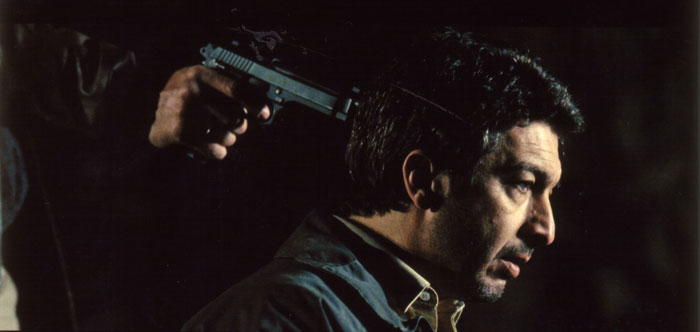
In the dying days of high school AP Spanish, my teacher (who was slated to retire after the year as well) decided to turn our classroom into a movie theater. Instead of doing assignments, we watched Spanish-language movies; in place of popcorn, we’d munch on chips, salsa, and flan. I have fond memories of this time—and out of the films we watched, I continue to believe that Nine Queens, a 2000 Argentine crime drama reminiscent of Ocean’s Eleven, was most enjoyable. As it turns out, Fabián Bielinsky, Nine Queens’ director, only made one other film before dying from a heart attack in 2006. That other film is The Aura which, like Nine Queens, centers on crime and stars Ricardo Darín (who’s also in Chinese Take-away).
The Aura, however, is decidedly less lighthearted than Nine Queens; it’s more No Country for Old Men than Ocean’s Eleven. Our antihero in this movie is Esteban Espinoza (Ricardo Darín), a reserved, epileptic taxidermist who fantasizes about committing the perfect crime. He claims both cops and robbers are stupid, and that he could use his photographic memory and intellect to do better. On an impromptu hunting trip, Espinoza stumbles upon an opportunity to do just that: after accidentally killing a hunting guide with criminal ambitions, he inherits the dead man’s scheme to rob a casino.
Espinoza is the driving force of the film: virtually all other characters revolve around him, and come and go as a result of his actions. However, as an epileptic, he also has limited control over himself: in a fascinating but easy-to-miss scene, he beautifully explains how epilepsy feels. Before each seizure, he says, he is seized by “the aura”. The world stops and his head opens, letting in sights, sounds, smells, and tastes; a feeling of powerlessness sweeps over him, telling him that there is nothing he can do to stop what’s coming. “It’s horrible, and it’s perfect,” Espinoza describes.
To a certain extent, you could say the same about the film, though I wouldn’t go as far as to label it 100% perfect. The horror in The Aura doesn’t fly straight in your face; it’s a subtle, cringe-inducing kind that scares you out of subtlety. Espinoza frightens with his lack of outward passion, and the other characters have their own hidden scars and mysteries as well (though you could also say most of them have rather underdeveloped backstories).
With its emphasis on crime, The Aura falls within the realm of neo-noir film, which shows through not only plot/character but also visual construction. Most of the story occurs either in the dense Patagonian forest or in hardscrabble towns far from Buenos Aires. Images come through delicate camera work. The film makes frequent use of pans and sometimes approaches subjects from unconventional angles. The overall image is gritty, but still polished in another sense; now I’m even more tempted to visit Patagonia myself.
I’d say The Aura has plenty of material for analysis if you try hard enough, but is still a very approachable and well-paced film if you’re just looking for some Friday night entertainment. While it isn’t a fast-paced conman caper like Nine Queens, it keeps you engaged and tugs appropriately with suspense. The Aura provides a balanced approach: it’s not particularly mind-blowing, but it’s still food for thrills and thought.
The Aura (Spanish: El Aura)—Argentina. Directed by Fabián Bielinsky. First released September 2005. Running time 2hr 18min. Starring Ricardo Darín, Dolores Fonzi, Pablo Cedrón, and Alejandro Awada.